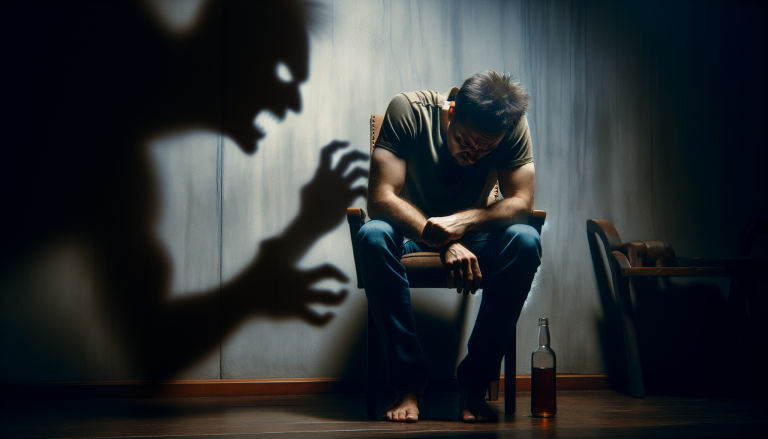Navigating through life can be complicated, particularly if you or someone close to you is struggling with an alcohol issue. Studies indicate that in 2014, approximately 586,780 adults were estimated to have Alcohol Use Disorder (AUD) in the UK, and we want to help provide ways of recognizing and addressing this abuse so as to better understand how one’s relationship with alcohol affects their lives. So how do you tell if you have a problem with alcohol?
Key Takeaways
-
Recognize the signs of alcohol abuse and take action to protect yourself.
-
Be aware of potential physical and psychological symptoms, cravings for alcohol, withdrawal effects, increased tolerance levels, etc., that can arise from drinking.
-
Seek help from loved ones or professional resources to address any issues related to alcohol consumption early on, you are not alone!
Recognizing the Signs of Alcohol Abuse

Alcohol abuse can be difficult to detect as it is often disguised by seemingly innocent explanations like ‘I just had a rough day’ or ‘one more drink.’’ To discover the issue, recognizing warning signs such as modifications in behavior and attempts at secrecy regarding drinking are paramount. It should not come unexpected that excessive alcohol intake alone could represent a health problem and an alarm bell for trouble.
By spotting these cues swiftly, persons abusing alcohol have greater chances of taking prompt actions to stop drinking and to prevent harm caused by consuming large quantities of this substance on their life and overall healthiness.
Behavioral Changes After Drinking
Alcohol has the power to profoundly influence behavior, shifting an otherwise tranquil individual’s mood and causing unpredictable actions. Every glass of alcohol affects neurotransmitter levels in one’s brain chemistry, resulting in confusion and depression while creating a foggy mental state that impairs judgment. If alcohol wear consumed excessively, it can lead to adverse consequences due to its disruptive effects on our brains, which may cause us not only psychological distress but also physical harm. Research has found drinking too much leads directly to problematic attitudes or erratic conduct with serious repercussions for anyone who decides to take part in this dangerous activity. Alcohol consumption needs to be taken very seriously indeed!
Secrecy Surrounding Alcohol Use
Alcohol use disorder, or alcohol abuse as it’s commonly known, is a tricky issue to detect and can be difficult for those suffering from the condition to admit. Despite wanting to prevent consequences of their drinking habits, feelings of shame and fear often lead them towards being deceptive about just how much alcohol they consume, with even cleverly hidden evidence pointing toward alcohol consumption potentially going unnoticed.
Impact on Work and Personal Life
Alcohol misuse can be very destructive, impacting both personal and professional lives. It’s not just the liver that takes a toll, but also relationships, mental wellbeing and job performance too. The damaging effects of drinking alcohol are far-reaching – from affecting your heart to your brain, pancreas, and immune system. It even raises cancer risk in some cases. Recognizing this issue early on is extremely important so one can get help before it becomes hard to handle any Damage caused by the alcohol abuse and alcoholism because of alcohol consumption habits.
Physical and Psychological Symptoms of Alcohol Dependence

Understanding the signs and symptoms of alcohol dependence can save you from potentially dangerous consequences. Symptoms may manifest in both physical and psychological forms, such as episodes of intoxication with alcohol or secret drinking binges accompanied by an overwhelming urge to consume it. Detecting these warning signals should be taken seriously, they point towards a path for recovery rather than progressing along the road leading to dependency on this substance. Recognizing that someone is suffering from withdrawal due to heavy use of alcohol is also essential when guiding them out of addiction.
Withdrawal Symptoms
Alcohol withdrawal can take a toll on someone’s physical and mental health, resulting in uncomfortable symptoms such as restlessness, anxiety, nausea or sweating. It is never pleasant to experience this type of response after reducing or ceasing alcohol consumption.
It doesn’t stop at the physical effects – when trying to cut down on drinking habits we may be struck with psychological disruptions including depression, agitation, and changes in moods which could lead us into frustration and irritability states.
Therefore, alcohol withdrawals should not be taken lightly because they leave an individual vulnerable both physically due to negative responses from their body, but also mentally because emotions become very strained during moments when one needs sobriety away from booze intake for longer than usual periods of time.
Increased Tolerance
It is like having to scream at the top of your lungs in a noisy environment. This analogy applies when it comes to an increased tolerance for alcohol. You require more drinking than usual just to get the desired effect – and unfortunately, such a growing resistance can be damaging with risks such as heavy alcoholic intake, becoming addicted to harmful drinking, or hazardous health effects following its trail.
This pattern of ever-increasing alcoholism acts as a ticking time bomb which will ultimately lead down the path towards addiction problems or substance abuse issues if left unchecked.
Cravings for Alcohol
Alcohol cravings can be overwhelming and alluring, just like a moth to a flame. They may take the form of an obsession with alcohol or even physical or emotional reliance on it for coping mechanisms. Those desire are usually driven by things such as chemical alterations in the mind due to frequent drinking, social pressure from those around us who consume alcohol, heightened stress levels coupled with adverse emotions. While offering positive effects on moods that make it more appealing than other options.
Overcoming these cravings is essential but very difficult when looking at long-term sobriety goals which rely on lessening one’s dependence on alcohol consumption altogether.
Self-Assessment Tools and Resources
Self-assessment tools can serve as a guiding light through the complicated terrain of alcohol dependency. Tests like CAGE and AUDIT are very helpful for diagnosing any drinking problems. If you have answered yes to two or more questions in these questionnaires, it is strongly suggested that professional medical attention be sought out immediately – shunning potential signs such as binge drinking/consuming larger amounts than anticipated, strong cravings when not consuming booze, plus withdrawal symptoms when no alcohol is being taken into your system would just be akin to ignoring an alarm going off!
Strategies for Addressing Alcohol Problems

Dealing with alcohol-related issues can be aided by the implementation of successful strategies, similar to how a reliable lifeboat provides security in turbulent waters. Potential measures such as establishing regulations against excessive drinking and rendering assistance for those who consume too much alcohol along with other public health initiatives have been known to help counter drink problems. Seeking out help from your family or looking into professional support could also prove beneficial on this journey towards achieving sobriety.
Seeking Support from Friends and Family
Conversing with those close to you can give comfort and understanding, which is much like a lighthouse giving guidance for ships in distress. Talking about alcohol abuse delicately within the family and amongst friends requires effort, yet it will surely be worthwhile.
Your loved ones may become your main supporters by helping you acquire professional help as well as joining alcoholic support groups that provide an environment of support group security throughout this journey of healing from addiction to alcohol.
Considering Professional Help
When dealing with alcohol abuse or mental disorders, seeking the assistance of a professional is often advised. Therapists and psychologists can use cognitive-behavioral therapy (CBT), motivational interviewing techniques, or support groups to help you in overcoming addiction problems. There are also rehab programs specially designed for individuals struggling with alcohol dependence which provide structure treatment that maximizes positive outcomes for those who seek help. Don’t despair if you’re caught up in this storm – assistance is available close at hand!
Preventing Alcohol-Related Issues

A stitch in time saves nine. Preventing alcohol-related issues before they start will save much distress. Pay attention to the warning signs of a drinking problem and take proactive steps, such as limiting your consumption of alcoholic beverages, to avoid running into difficulties related to abuse. To create a protective barrier against any potential complications from consuming too much liquor, here are some smart ways you can act: reduce or forego drinking alcohol altogether while finding better alternatives for managing stress levels, snack both prior to imbibing and between drinks, make changes that accommodate longterm sobriety goals by engaging in regular physical activities combined with healthy eating habits which balance out what one consumes on an everyday basis, this combination helps significantly decrease unhealthy connections towards drink intemperance when it is partaken upon occasionally.
The Importance of Early Intervention and Treatment
For better long-term outcomes and prevention of complications, it is essential to take early action in the treatment for all alcohol use disorders and abuse. The preventive services task force has a key role in this process by pushing ahead with strategies that enable an earlier diagnosis. Just like taking the train before its departure time, dealing with issues associated with drinking booze at an early stage ensures greater chances of successful recovery along with avoiding any health problems from arising or worse consequences both socially and personally. To these benefits, individuals can also access a range of different therapeutic choices when they decide on seeking help as soon as possible after confronting their struggles related to alcohol use disorder.
Resources for Support and Treatment
In tackling alcohol problems, a map is essential. With numerous support resources and treatment options available to you, such as Alcoholics Anonymous or an institute on alcohol abuse with national coverage (similar to a lighthouse in stormy seas), your journey does not have to be undertaken alone. From online help from NHS Choices, Al-Anon meetings or platforms like Talkspace and Monument for therapy sessions – there are many ways you can find the assistance needed when combating alcohol addiction.
With these tools by your side, it’s easier than ever before to overcome obstacles related to this issue. Whatever path of recovery lies ahead needsn’t feel like facing into unknown dark waters without direction, but instead one guided through lighted pathways of hope towards sobriety instead! Remember that lots of guidance exists beyond just those already mentioned too: professional healthcare providers offer targeted advice on how best manage cravings as well as addressing any underlying mental health issues along the way too if necessary.
Knowing which route leads onwards successfully requires knowledge however – so armed with research solutions at hand start paving today what could lead to tomorrow’s healthy lifestyle without having said substance dominate anymore.
Summary
We’ve examined signs of alcohol abuse, symptoms (both physical and psychological) associated with dependence on the substance, self-evaluation tactics to help identify any issues related to drinking, techniques for tackling those alcohol related problems now, and how early intervention is beneficial. Recognizing warning signs swiftly can make a big difference when it comes to recovery from alcohol-related challenges. Remember there are resources available that can be accessed in order to find your path towards wellness.
Frequently Asked Questions
How can I identify potential alcohol problems?
What are the 4 types of drinker?
Do you know which type of drinker you are? Social, coping, conformity or enhancement, Identifying what kind could help in making more conscious decisions when it comes to drinking alcohol. Understanding your drinking habits can provide insights into your relationship with alcohol. Are you a social drinker who only consumes alcohol in a social setting, or are you a coping drinker who uses alcohol to deal with stress and emotional discomfort? Maybe you drink to conform to your social group, or perhaps you drink for enhancement, to amplify positive feelings and experiences. Recognizing your pattern can be a crucial step in managing your alcohol consumption and ensuring it doesn’t lead to harmful consequences.
What are some common signs of alcohol abuse?
Indicators of alcohol abuse include alterations in behavior, drinking conducted under the radar, effects of alcohol intoxication on both work and personal life such as erratic moods or hostility while intoxicated, plus a higher tolerance to the substance.
What are some physical and psychological symptoms of alcohol dependence?
Alcohol dependence can have both physical and psychological effects. Physical symptoms may include experiencing withdrawal when reducing or ceasing alcohol intake, whereas the mental impacts could take form of an overwhelming compulsion to drink alcohol as well as alterations in pleasure judgement and behavior due to brain changes related to drinking alcohol.
Authors
-
Andy's journey in psychology and substance recovery is marked by significant educational and professional achievements. He studied Person Centered Counseling, gained insights from psychological literature, and completed an online course on the mind. His hands-on experience includes volunteering at a Drug and Alcohol Clinic and earning a diploma in child adverse experiences. Andy holds a first-class honors degree in Psychology with Substance Use and Misuse. Professionally, he has contributed as a Lived Experience Coordinator and counselor, offering hope and empowerment to those in recovery. Qualifications and Experience: Introductory Course in Person Centered Counseling Extensive study of psychological literature (including Carl Rogers and Freud) Online course completion on the Mind from UCT OCN peer mentoring course Level 3 diploma in child adverse experiences First-class honors degree in Psychology with Substance Use and Misuse Experienced Lived Experience Coordinator for Probation Dependency and Recovery service
-
Dr Otulana is PCP’s longest-serving doctor. He is an experienced Physician with Specialist Interest in Substance Misuse Management and he has a wide range of experience in the assessment and management (including detoxification) of clients with various drug and substance addiction problems. Dr Otulana started practising as a doctor in 2000 and with over 10 years as an Addiction Physician. He is an Advanced Addiction Practitioner Member of Addiction Professionals and also holds the Certificate in Clinical Psychopharmacology (Part 1) of the British Association for Psychopharmacology. He is additionally a strong healthcare services professional with a Master of Business Administration (M.B.A.) degree from Cambridge University Judge Business School.









